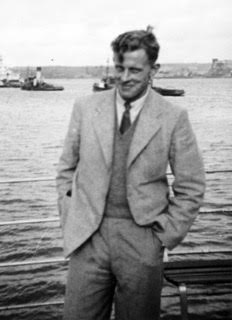PHILIPPA JANET GOULD (16 November 1916 — 9 March 2016)
Philippa will be remembered by many at Fairlynch for her sense of fun
and for her immense knowledge of the Museum’s collections.
She was born
Philippa Janet de Smidt in Devon, the second eldest of four girls. With her Father away working in Egypt she
and her sister Sue were brought up in their early years by their Grandmother and
seven maiden aunts living in Tiverton Castle.
It was a happy existence far
removed from the troubles of the Great War. At boarding school she excelled in
tennis and swimming. As an adventurous 17-year she tutored two children in
English during a four-month stay in Dresden; she recalled having to maintain
interminably a Nazi salute while attending a rally led by Goebbels, too
terrified to lower her arm.
Her marriage
to Nigel Arthur Campbell in 1938 interrupted the Domestic Science course which
she had embarked on following her return to England. With Nigel a PoW for the
duration of WW2, she had to bring up daughter Jane on her own in Exeter, but
after the 1942 Blitz they moved to Tiverton to live with her family.
Eventually in 1945 Nigel returned to meet Jane for the first time and in 1948,
shortly after their son Neil was born, they moved to Sampford Peverell.
A
further adventurous spell in her life came when at the age of 55 she moved to
Rome as a governess, finding brief happiness with her second husband, Michael
Gould who was sadly to die of a heart attack after only two years. Then
followed several years on her own in Italy where, Philippa, not to be daunted,
embarked on a new career setting up a smoked salmon business with friends in
Rome.
But in 1980 Neil persuaded her that they needed a Granny in
South Africa, and once in Johannesburg Philippa became curator of the Gold Mine
Museum.
On her return to Devon aged 70, living in Otterton near Jane and
her family, she soon became involved with Fairlynch where for many years she
was involved in setting up the costume display.
She was a keen member of
East Devon Golf Club, playing till almost 90, and became involved in the
Otterton village community, including St Michael’s Church.
A fellow-helper remembers her love for the doll collection; she knew
them all by name and their histories. She was particularly fond of Cecil
the teddy bear and knew his wartime history. ‘When climbing the stairs became
too difficult for her and she could not help out in the costume room she would
ask us about our display and which of the many costumes we had used,’ recalls
the same Fairlynch volunteer. ‘She knew them all.
With Philippa’s passing the
Museum has lost a great ambassador and a true supporter. I have lost a
friend and life will not be the same without her great humour.’




Comments
Post a Comment